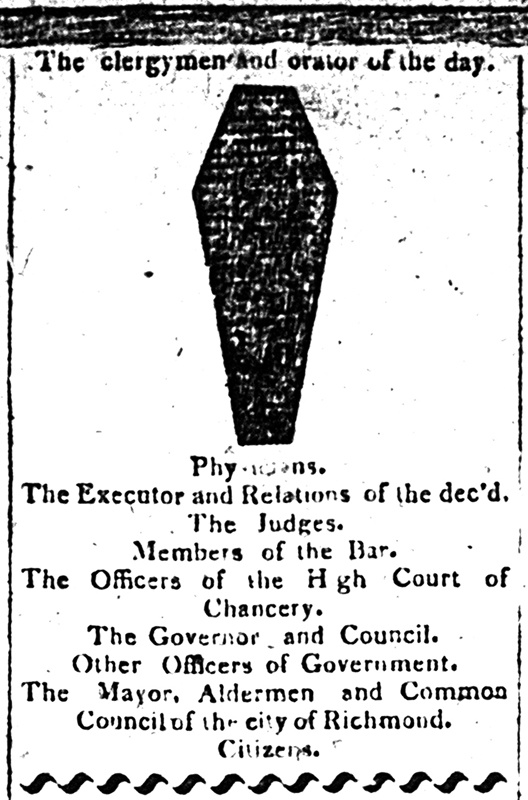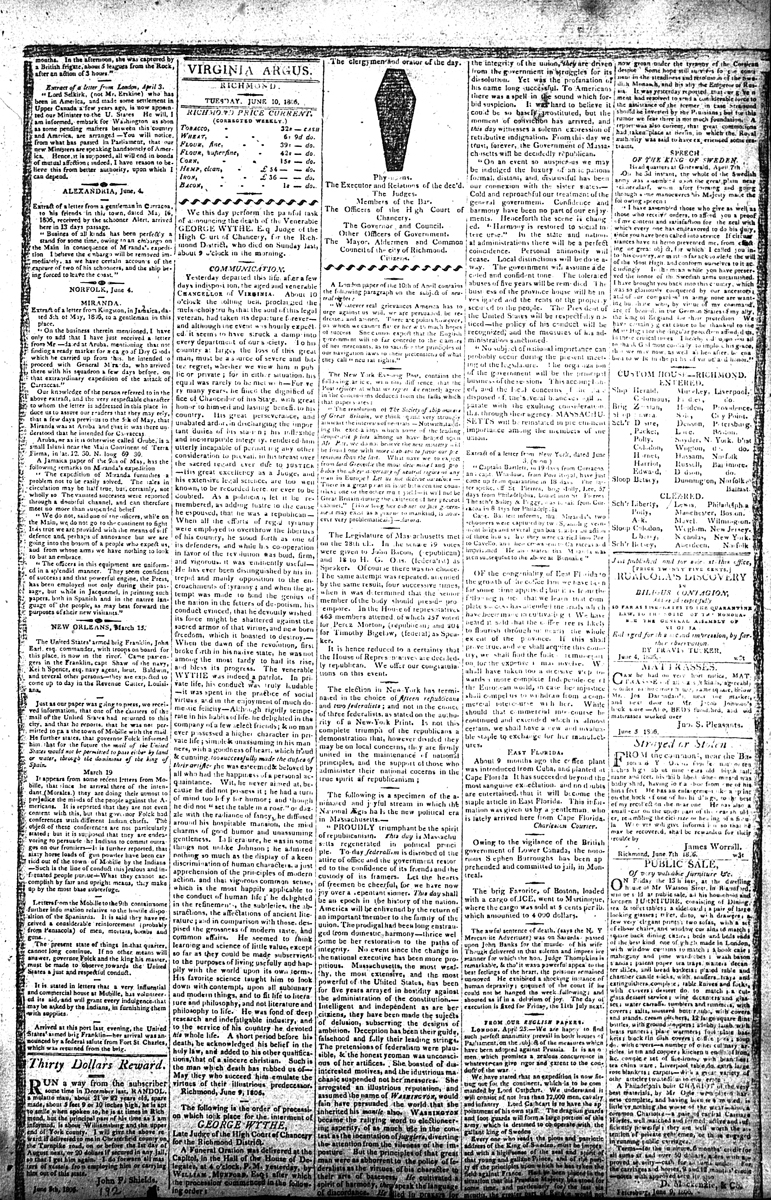 Detail of the Executive Council of Virginia's order of procession for the funeral of George Wythe. The Virginia Argus published an announcement of the death of George Wythe on June 10, 1806, with details of the order for his funeral procession, and accompanied by a biographical sketch (titled "Communication").[1] This issue of the Argus was printed with a thick black border around this page, as a sign of respect for the passing of Chancellor Wythe.
Because the Argus was published semi-weekly (Tuesdays and Fridays), the announcement did not appear until the day after Wythe's funeral. Another announcement was made the same day in the Richmond Enquirer.
Article text, 10 June 1806
Page 3
VIRGINIA ARGUS.
RICHMOND.
TUESDAY, JUNE 10, 1806
We this day perform the painful task of announcing the death of the Venerable GEORGE WYTHE, Esq. Judge of the High Court of Chancery, for the Richmond District, who died on Sunday last, about 9 o'clock in the morning.
COMMUNICATION.
Yesterday departed this life, after a few days indisposition, the aged and venerable CHANCELLOR OF VIRGINIA. About 10 o'clock the tolling bell, proclaimed the melancholy truth, that the soul of this legal veteran, had taken its departure forever—and although the event was hourly expected it seems to have struck a damp into every department of our society. To his country at large, the loss of this great man, must be a source of severe and bitter regret, whether we view him in public or private; for in either situation, his equal was rarely to be met with—For very many years, he filled the dignified office of Chancellor of his Stage, with great honor to himself and lasting benefit to his country. His great perseverance, and unabated ardor in discharging he important duties of his station; his inflexible and incorruptible integrity, rendered him utterly incapable of permitting any other consideration to prevail, in his breast over the sacred regard ever due to JUSTICE.—His great excellency as a Judge, and his extensive legal science, are too well known, to be recorded here or ever to be doubted. As a politician, let it be remembered, as adding lustre to the cause he espoused, that he was a republican—When all the efforts of regal tyranny were employed to overthrow the liberties of his country, he stood forth as one of its defenders, and while his co-operation in favor of the revolution was bold, firm, and vigorous, it was eminently useful—He has ever been distinguished by his intrepid and manly opposition to the encroachments of tyranny; and when the attempt was made to bind the genius of the nation in the fetters of despotism, his conduct evinced, that he devoutly wished its force might be shattered against the sacred armor of that virtue, and new born freedom, which it boasted to destroy.—When the dawn of the revolution, first broke forth in his native state, he was not among the most tardy to hail its rise, and bless its progress. The venerable WYTHE was indeed a patriot. In private life, his conduct was truly laudable—it was spent in the practice of social virtues and in the enjoyment of much domestic felicity—Although rigidly temperate in his habits of life he delighted in the company of a few select friends; & no man ever possessed a higher character in private life; simple & unassuming in his manners, with a goodness of heart, which fraud & cunning too successfully made the duties of their artifice; he was esteemed & beloved by all who had the happiness of a personal acquaintance. Wit, he never aimed at, because he did not possess it; he had a turn of mind too lofty for humor; and though he did not "set the table in a roar" or dazzle with the radiance of fancy, he diffused around his hospitable mansion, the mind charms of good humor and unassuming gentleness. In literature, he was in some things not unlike Johnson; he admired nothing so much as the display of a keen discrimination of human characters, a just apprehension of the principles of modern action, and that vigorous common sense, which is the most happily applicable to the conduct of human life; he delighted in the refinements, the subtleties, the abstractions, the affectations of ancient literature; and in comparison with these, despised the grossness of modern taste, and common affairs. He seemed to think learning and science of little value, except so far as they could be made subservient to the purposes of living usefully and happily with the world upon its own terms. His favorite science taught him to look down with contempt, upon all sublunary and modern things, and to fit life to literature and philosophy, and not literature and philosophy to life. He was found of deep research and indefatigable industry, and to the service of his country he devoted his whole life. A short period before his death, he acknowledged his belief in the holy law, and added to his other qualifications, that of a sincere christian. Such is the man when death has robbed us of—May they who succeed him emulate the virtues of their illustrious predecessor.
- Richmond, June 9, 1806.
The following is the order of procession which took place for the interment of
GEORGE WYTHE,
Late Judge of the High Court of Chancery for the Richmond District.
A funeral Oration was delivered at the Capitol, in the Hall of the House of Delegates, at 4 o'clock, P.M. yesterday, by WILLIAM MUMFORD, Esq; after which the procession commenced in the following order:
The clergymen and orator of the day.
[Drawing of a coffin.]
Physicians.
The Executor and Relations of the dec'd.
The Judges.
Members of the Bar.
The officers of the High Court of
Chancery.
The Governor and Council.
Other Officers of Government.
The Mayor, Aldermen and Common
Council of the city of Richmond.
Citizens.
See also
References
- ↑ Virginia Argus, June 10, 1806, 3.
External links
|

